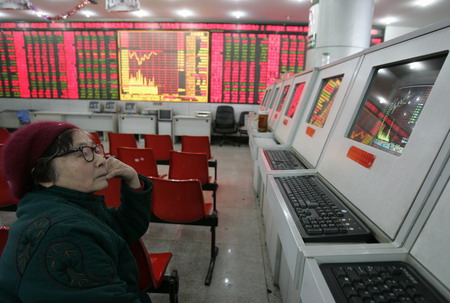Top Biz News
Stocks may hit bottom in April
(China Daily)
Updated: 2010-02-03 08:04
 |
Large Medium Small |
|
 |
|
An investor monitors stock prices at a brokerage in Taiyuan, Shanxi province. The benchmark Shanghai Composite Index has dropped 10 percent this year on concerns over policy tightening. [China Daily] |
JPMorgan says further falls are likely; cuts its MSCI China Index forecast
SINGAPORE: Chinese stocks may fall further before reaching a "bottom" in April or May as money supply growth slows and policy risks increase, JPMorgan Chase & Co said.
The brokerage cut its December 2010 forecast for the MSCI China Index, tracking mainly Hong Kong-traded mainland company shares, to 62 from 78, analysts led by Frank Li wrote in a note. The gauge on Monday rose 0.7 percent to 59.79.
The Shanghai Composite Index has dropped 10 percent this year, on concern the government will tighten monetary policy to curb inflation and asset price speculation. The Hang Seng China Enterprises Index has lost 9.2 percent.
"We could see more and harsher tightening measures to come from China in the coming months, as China's CPI is expected to keep rising till July or August before tapering off," the analysts wrote. "Despite the correction over the past month, MSCI China has yet to fully price in the current tightening cycle in China."
Record bank loans last year have added to the risk of asset bubbles and resurgent inflation. The nation's consumer prices climbed 0.6 percent in November from a year earlier, snapping a nine-month run of deflation. The government took its first steps on Jan 12 to curb lending by increasing the deposits banks must set aside as reserves.
Slowing money supply
China's money supply growth may slow to 17 percent this fiscal year from last year's 27.7 percent, Li said. The performance of Chinese equities tends to track money supply growth, he said.
JPMorgan's forecast for the MSCI index is based on a price-to-book value multiple of 2.1 times, the historical average since 2000, according to the report. The measure is currently valued at about 2.45 times book value, Bloomberg data shows.
|
||||
Further measures to control inflation may include a reserve-ratio increase, higher interest rates, regulation on bank lending and price caps on commodities, the JPMorgan analysts wrote.
The brokerage advised investors to be "overweight" on so-called defensive growth stocks such as Internet, gas, tissue and diapers, and healthcare companies. They have also "turned positive" on power producers, according to the report.
Property outlook
They recommend selling property shares and stocks reliant on fixed-asset investment, saying that these industries may be the "most vulnerable" to tightening measures.
BNP Paribas also said yesterday that the government may "get tougher" on the nation's property market because current measures haven't deterred homebuyers, developers and banks.
Volumes may fall 10 percent this year, compared with an earlier forecast of growth of as much as 5 percent, while prices will be "flat", BNP analysts Trevor Cheung and Frank Chen wrote in a report.
Bloomberg News













